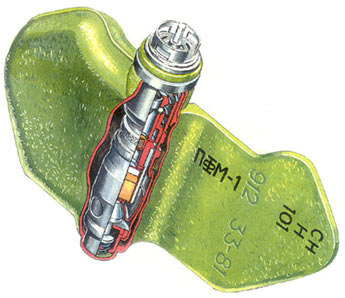INFO ONLY. NOT FOR SALE P90-15
Russian Toe Popper Landmine. Approximately 3" across.
Widely used in Afghanistan, the Soviet PFM-1 scatterable pressure-sensitive blast mine is also known as the "butterfly mine" because of its shape, which unfortunately attracts children who think it is a toy. It has been produced in various shades of brown, green and white. The PFM-1S version of this mine is one of the rare designs which includes a self-destruct mechanism. It explodes 24 hours after deployment.
The PFM-1 is the only known antipersonnel landmine containing toxic liquid explosive
PFM-1 (Russian: ПФМ-1, short for противопехотная фугасная мина - anti-infantry cluster landmine; NATO name: Green parrot, also known as butterfly mine) is a land mine of Soviet production, very similar to BLU-43 US Army landmine. Both devices are very similar in shape and principles, although they use different explosive.
Action
The mine is basically a plastic bag containing explosive liquid. The mine is stored with a pin restraining a detonating plunger. Once the arming pin is removed, the plunger is slowly forced by a spring forward until it contacts the detonator, at which point it is armed. This takes between one and forty minutes, allowing the mine to be deployed or air dropped.
Deformation of the soft plastic skin of the mine forces the arming plunger to strike the detonator, detonating the mine. Because the body of the mine is a single cumulative pressure primer, it is extremely dangerous to handle the mine: A single press of 5 kg or more presses, adding each other to 5 kg will make it go off. The charge is usually nonlethal, although sufficient for traumatic amputation of the foot. A variant of the mine, PFM-1S, self-destroys after one to forty hours, with 85% of the mines destroyed by 80 hours.
The mine can be deployed both from helicopters and by infantry. In the latter variant, a number of mines is spread over a circle with a diameter of ~15 meters.
Once the mine is armed it cannot be disarmed.
Military use
PFM-1 was mainly used during the Soviet Invasion of Afghanistan to prevent groups of insurgents from using certain roads. Unfortunately, civilians often fell prey to it. One of the unforeseen results of its military application was a high number of casualties among children. Due to its unusual shape, the mine was often mistaken for a toy by children. As the mine self-destructed, it often resulted in hand and head trauma, which was frequently lethal. This characteristic made this particular type of land mine a principal target for the International Campaign to Ban Landmines.
Russia has not signed the Ottawa Treaty, allowing them to retain this type of landmine in their arsenal.
Specifications
Weight: 75 g
Filling: 37 g of VS6-D or VS-60D liquid explosive
Fuze: MVDM/VGM-572
Length: 120 mm
Width: 20 mm
Height: 61 mm
Operating pressure: 5-25 kg

The destruction of stockpiled PFM-1/1S mines is still the subject of a number of technical questions, to which the international community as a whole needs to find answers. All of the 3.6 million PFM-1/1S mines should be destroyed as a priority. In the course of the Budapest International Seminar held in February 2001 it was proved that the mines’ liquid explosive contents continue to react with the weapon’s hermetic seals, leading to the detonator. Failure of these seals will allow the liquid explosive to come into contact with the detonator resulting in detonation. It is technically impossible at present to inspect the PFM-1 landmines in detail to try and identify the current state of the seals. Regardless, even if such a technical capacity did exist, the design of this type of APLMs is such that this inspection process would be prohibitively hazardous.